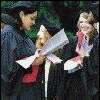 |
|
York University Houses World's First UNESCO Chair to Integrate the Education of Teachers with All Aspects of Environmental Sustainability
"To be given this recognition and this responsibility, in a field of such global importance, is a tribute to the work that York has already undertaken, in both our Faculties of Education and Environmental Studies, to educate, train and expand public understanding of the needs of environmental sustainability," said Stan Shapson, Associate Vice-President of Strategic Academic Initiatives at York, and co-developer of the project when he was Dean of Education.
Since the concept of environmentally sustainable development was endorsed by the United Nations in 1992, education, training and public understanding of sustainability has been recognized as a major objective of governments around the world. At a meeting of the UN Commission on Sustainable Development in New York in 1998, country after country testified that education was critical, but no models existed for implementing Education for Sustainable Development (ESD). UNESCO identified teacher education institutions as key agents for changing the orientation of education. It has now chosen York to lead the organization of this effort.
Charles A. Hopkins, a leader in the field of environmental education and former superintendent of curriculum with the Toronto Board of Education, will occupy the UNESCO Chair at York. Working with the Faculties of Education and Environmental Studies, he will develop an international network of institutions engaged in teacher training and education. The Chair will also organize the sharing of research and experimentation to develop models for reorienting education toward sustainable development. Dr. Rosalyn McKeown at the University of Tennessee at Knoxville will serve as Secretariat for the Chair and the international network.
"The project's underlying impulse is to integrate people's thinking about the environment, economy and society," said Hopkins. "Reorienting education requires changing how and what we teach so that students obtain the knowledge, skills, perspectives and values that will guide and motivate them to work and live in a sustainable manner." To do this effectively and completely, Hopkins says all disciplines in a teacher preparation institution can and should be involved in the reorientation process. "Math teachers could teach ėrelative risk' using concrete environmental examples; health educators could discuss environmental and stress-related illnesses related to particular countries and relevant local problems."
Hopkins says many institutions have already expressed interest in joining the international network to reorient teacher education. They will join a core group of administrators and faculty from 11 universities, who first came together in 1997 at a UNESCO consultation in Thessaloniki, Greece and agreed to work together as the Teacher Education Consultation (TEC). The TEC group comprises University of Athens and Aristotle University in Greece, Charles University in the Czech Republic, Chulalongkorn University in Thailand, Federal University of Parana in Brazil, Florida Coast University in the U.S., Griffith University in Australia, University of Edinburgh, Rhodes University in South Africa, University of Tennessee and York.
Hopkins is working to bring an additional 25 institutions into the program and says strong interest has been shown in Denmark, Pakistan, Austria, New Zealand and Japan. He has also had initial talks regarding institutions in Russia, Hungary, Nicaragua, Indonesia and Mexico.
Hopkins is currently special advisor to UNESCO on its Transdisciplinary Project: Educating for a Sustainable Future. He is also executive director of the John Dearness Environmental Society in Canada and is Chair of the Education for Sustainable Development Working Group of the UNESCO Canada Man and the Biosphere Committee. In 1992, Hopkins served as the Chair of the World Congress for Education and Communication on Environment and Development which brought together over 4,000 individuals from 81 countries to the first major international follow up to the UN Conference on Environment and Development. He was one of the drafters of Education, Public Awareness and Training as part of the UN preparation for the Earth Summit in Rio. Among earlier positions with the Toronto Board of Education, Hopkins was a regional superintendent and both founder and principal of Canada's largest environmental field study centre, the Boyne River Natural Science School and the Toronto Urban Studies Centre, North America's only school-board owned urban studies centre.
For further information, please contact:
Stan Shapson
Charles Hopkins
Sine MacKinnon |
|
|
| | Welcome to York University | Latest Release | Release Archives | |
![[to York's Home Page]](../../images/yorklogos.gif)
